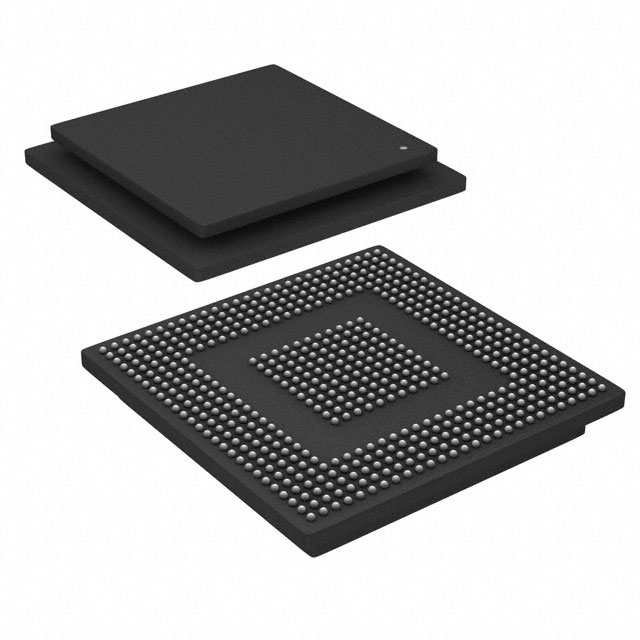TMS320C6474FCUN2
Manufacturer No:
TMS320C6474FCUN2
Manufacturer:
Description:
IC DSP MULTICORE 561CSP
Datasheet:
Delivery:





Payment:




In Stock : 0
Please send RFQ , we will respond immediately.









TMS320C6474FCUN2 Specifications
-
TypeParameter
-
Supplier Device Package561-FC/CSP (23x23)
-
Package / Case561-BFBGA, FCCSPBGA
-
Mounting TypeSurface Mount
-
Operating Temperature0°C ~ 95°C (TC)
-
Voltage - Core1.10V
-
Voltage - I/O1.1V, 1.8V
-
On-Chip RAM3.168MB
-
Non-Volatile MemoryROM (64kB)
-
Clock Rate1.2GHz
-
InterfaceEthernet MAC, I²C, McBSP
-
TypeFixed Point
-
PackagingTray
-
Product StatusActive
-
SeriesTMS320C647x
The TMS320C6474FCUN2 is a high-performance digital signal processor (DSP) integrated circuit chip developed by Texas Instruments. It offers several advantages and can be applied in various scenarios:1. High Performance: The TMS320C6474FCUN2 is designed to deliver high processing power with a clock speed of up to 1.0 GHz. It has eight C64x+ DSP cores, each capable of executing eight instructions per cycle. This makes it suitable for computationally intensive applications that require real-time processing.2. Multicore Architecture: The chip's multicore architecture allows for parallel processing, enabling efficient execution of complex algorithms. It supports interprocessor communication and synchronization, making it ideal for applications that require distributed processing or multi-channel processing.3. Integrated Peripherals: The TMS320C6474FCUN2 integrates various peripherals, including Ethernet MAC, USB, UART, SPI, and I2C interfaces. This simplifies system design and reduces the need for external components, making it suitable for applications that require connectivity and communication capabilities.4. DSP Functionality: As a DSP chip, the TMS320C6474FCUN2 offers a wide range of digital signal processing features, such as fixed-point arithmetic, SIMD (Single Instruction, Multiple Data) instructions, and specialized DSP instructions. This makes it well-suited for applications like audio and video processing, telecommunications, radar systems, and medical imaging.5. Software Development Tools: Texas Instruments provides a comprehensive software development kit (SDK) for the TMS320C6474FCUN2, including a C compiler, assembler, debugger, and various libraries. This facilitates the development of applications and reduces time-to-market.Application scenarios for the TMS320C6474FCUN2 include:1. Wireless Infrastructure: The chip's high processing power and multicore architecture make it suitable for wireless base stations, where it can handle multiple channels and perform real-time signal processing for tasks like modulation, demodulation, and error correction.2. Audio and Video Processing: The TMS320C6474FCUN2 can be used in audio and video processing applications, such as audio codecs, video encoders/decoders, and multimedia systems. Its DSP capabilities enable efficient processing of audio and video signals.3. Medical Imaging: The chip's high performance and DSP functionality make it suitable for medical imaging applications, such as ultrasound machines, CT scanners, and MRI systems. It can handle complex algorithms for image reconstruction, filtering, and enhancement.4. Industrial Automation: The TMS320C6474FCUN2 can be used in industrial automation systems, such as robotics, motion control, and machine vision. Its processing power and integrated peripherals enable real-time control and image processing tasks.5. Telecommunications: The chip can be applied in telecommunications infrastructure, including routers, switches, and gateways. Its high performance and connectivity features allow for efficient packet processing, protocol handling, and network management.Overall, the TMS320C6474FCUN2 offers high performance, DSP capabilities, and integrated peripherals, making it suitable for a wide range of applications that require real-time processing, connectivity, and signal processing capabilities.
TMS320C6474FCUN2 Relevant information
-
TMS320C28341ZHHT
Analog Devices Inc. -
R2580
Fairchild Semiconductor -
R2579
Analog Devices Inc. -
R2581
Fairchild Semiconductor -
MSC8156SAG1000B
Harris Corporation -
MSC8122TVT6400V
Harris Corporation -
SAF7741HV/N129D,55
Nexperia USA Inc. -
MSC8252TAG1000B
Harris Corporation -
MSC8154TAG1000B
Harris Corporation -
R2577
Analog Devices Inc.







